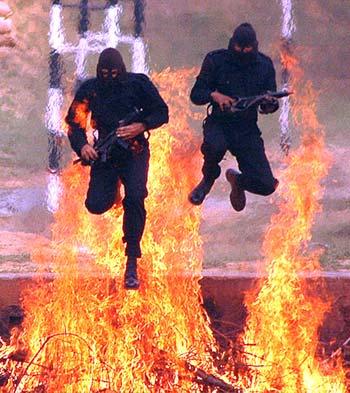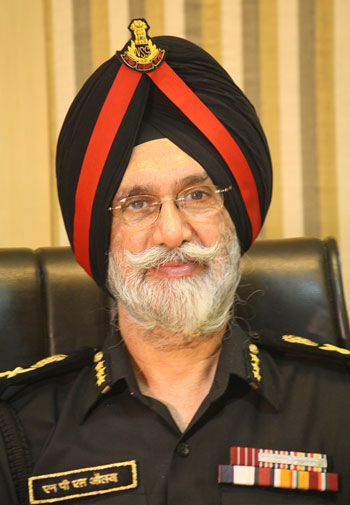Photographs: Sondeep Shankar Archana Masih
The National Security Guard can charter aircraft from eight private airlines for counter-terror operations to prevent a delay like the one that occurred during the Mumbai terrorist attack when precious time was lost in transporting commandos from New Delhi.
The government's highly trained and sophisticated counter-terror and counter-hijack force has signed a memorandum of understanding with the private airlines and the NSG's director general has been empowered to requisition the aircraft.
The NSG can also request the Indian Air Force for aircraft for support and training; also the ministry of home affairs's air wing.
"Post 26/11, we have introduced new specialised skills, especially intervention in high rise buildings. We are training more commandos in helicopter interventions. We have also enhanced our weaponry and are procuring better equipment for surveillance and communication," Director General N P S Aulakh said at the NSG headquarters in New Delhi on Tuesday.
The NSG has been conducting mock drills and recces of sensitive spots like malls and metro stations and rehearsals of routes to enhance its preparedness.
"We are even better prepared to carry out operations in urban areas and have added additional tactics to enhance mental endurance and physical capability," said Aulakh, a 1972 batch Indian Police Service officer who has served earlier stints as the director general of police, Punjab, and additional director general, west, Border Security Force.
As the fallout of 26/11, he revealed, the NSG had received several more requests from the police from various states to train their personnel as commandos for counter-terror operations. "Most of the states have requested the NSG and we run a number of courses," he said.
The NSG is also considering training with international counter-terror agencies to further enhance its capabilities. "A team from the French special force, the GIGN, had come and we went to Germany to interact with German counter terrorism force -- GSG 9 -- but this is still at the initial stage."
NSG strength to increase by 13,000 commandos
Image: NSG Director General N P S Aulakh at his office in New Delhi.Photographs: Rajesh Karkera
NSG personnel are expected to move into the pre-fabricated structures by the second week of December, though the permanent structures will be ready by next year.
"But training is already being carried out at the hubs from the temporary structures. The training had started by June 30," adds NSG Director General N P S Aulakh.
The hubs are located close to the airports to facilitate faster access to aircraft so that the response time can be reduced significantly.
"The NSG is thinking of a dedicated aircraft from the home ministry or IAF but we haven't put up that proposal yet," he said.
Meanwhile, the NSG will use its own ground transportation assisted by the local police in the cities where the hubs are located.
The government has also sanctioned two NSG regional centres in Hyderabad and Kolkata for which land is being procured. The regional centres, which will be like the NSG garrison in Manesar, Haryana, will constitute 10,300 commandos. The hubs and the setting up of the regional centres will increase the NSG strength by 13,000 that are on deputation from the Indian Army and the paramilitary forces.
The army faces a shortage of officers itself, but Aulakh said, "They have not said that they will not provide us with personnel. They make efforts to give us whatever they can. It may not be 100 per cent but at least it is 75 to 80 per cent."
The NSG training, he said, has incorporated better synergy between its two arms -- the Special Action Group, comprising army personnel, and the Special Ranger Groups, comprising men from the paramilitary and state police force -- in combat roles.
Modelled like the United Kingdom's SAS and Germany's GSG 9, the NSG lost two commandos -- Major Sandeep Unnikrishnan and Havildar Gajendra Singh Bisht in Operation Black Tornado in Mumbai.
While the 26/11 terror anniversary is being observed in several state and private organisations, Aulakh said, "We don't observe any anniversary, we've carried out so many operations. We have a martyrs' memorial for the brave men who gave their lives at the altar of duty, their names are etched on the memorial. We have a wreath laying ceremony on our raising day and on the police commemorative day."
Looking back at the 26/11 attacks, and asked if he would have done anything differently, he said: "In hindsight everyone becomes wiser. You learn be experience. I don't think I would have done it in a better way. My colleagues in the Mumbai police and the NSG tried their level best with the capabilities, with the resources available to them. They tried their best."



article